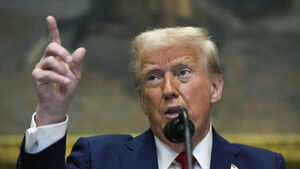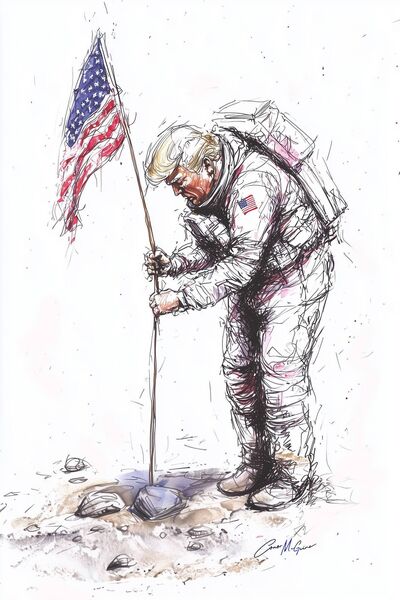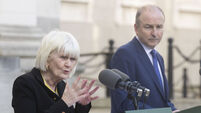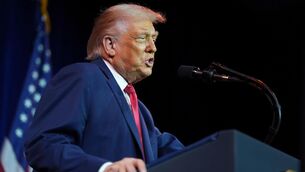Trump is determined to upend the global order

US President Donald Trump speaks in the Roosevelt Room of the White House. Picture: AP Photo/Julia Demaree Nikhinson
From my perch in Mayo, watching America's latest political metamorphosis feels like observing a peculiar theatrical production where the intermission lasted precisely four years. The protagonist has returned, more grandiose than ever, with a script that reads like magical realism penned by a Manhattan real estate developer.
Donald Trump's second inaugural address, delivered in the very Capitol that bore witness to the wounds of January 6th, traded the 'American carnage' rhetoric for something more expansive - quite literally. His vision now stretches beyond walls to encompass Greenland, Canada, and even Mars. It's manifest destiny on steroids, served with a side of cryptocurrency and a sprinkling of TikTok controversy.
The perceptions of a compromised electoral process hang like a delicate thread over this entire spectacle and Trump's triumphant return to power seems to have transformed not just the political landscape but the very nature of American democracy itself.
In a century marked by global partnerships, Trump's vision departs radically from traditional approaches to Western hemisphere relations, where diplomacy, or at least the appearance of it, was fundamental. While previous administrations sought integration through trade and diplomatic ties, Trump's approach seems more reminiscent of 19th-century territorial expansion.
The scene in the Rotunda was a peculiar tableau: tech billionaires seated like Renaissance patrons, former presidents maintaining frozen smiles, and Trump himself, holding court with the confidence of a man who believes divine intervention deflected an assassin's bullet for the greater purpose of "making America great again". The irony of preaching American exceptionalism in a building that his supporters once breached seems lost on everyone except the conspicuously absent Michelle Obama.
What's most striking about this second coming of Trump is not just the man himself but how the landscape has shifted to accommodate his gravitational pull. The tech titans who once viewed him as an amusing anomaly now genuflect before him. The Republicans who once whispered their concerns now compete to show their fealty. The Democrats appear not so much defeated as deflated, their resistance reduced to carefully calibrated absences from ceremonial lunches.
The spectacle itself moved indoors due to an "Arctic blast" (though one suspect's crowd-size anxieties played their part) and became a masterclass in Trumpian theatre. Even the Naval Academy Glee Club's rendition of felt less like a patriotic tribute and more like a coronation anthem, with Trump swaying to lyrics about truth marching on - perhaps the day's most exquisite irony.

For us in Europe, Trump's neo-imperial ambitions strike a particularly discordant note. His casual discussion of territorial expansion, including the unprecedented suggestion of American colonies on Mars, represents the first serious presidential advocacy for territorial acquisition in over a century.
This isn't merely a rhetorical flourish - at a recent Florida press conference, Trump doubled down on his vision of a new American imperialism. It's a vision that eerily echoes the colonial powers of old, though repackaged in modern corporate language, as if annexing sovereign territories were simply another chapter in .
Europe's historical memory of empire is long and complex. The continent's experience has been marked by the rise and fall of various hegemons. Now, watching America's apparent embrace of naked imperialism, we're reminded of how empires often begin - not with grand proclamations of conquest, but with seemingly reasonable proposals for "expansion" and "integration".
Trump's expansionist threats unmask something fundamental about American power projection. While previous administrations cloaked their imperial ambitions in the language of democracy promotion and humanitarian intervention, Trump's approach is starkly transactional, viewing nations and territories as real estate to be acquired, much like his early property deals in New York.
This new American imperialism represents a troubling departure from post-war international norms. For Europe, which spent the latter half of the 20th century dismantling its colonial structures, watching America potentially embrace such naked imperialism feels like watching history run in reverse.
The tech barons in attendance, from Musk to Bezos, represented not just Silicon Valley's capitulation to Trumpism but also the merger of two forms of power: political populism and digital oligarchy. Their presence in the front rows, while elected officials sat in cheaper seats, told its own story about the changing nature of American power.
But it was Elon Musk who created the day's most controversial moment. His gesture, captured on camera and immediately viral, sparked a heated debate about its resemblance to a fascist salute. While Musk later denied any such intent, the image of the world's richest man appearing to make such a gesture at a presidential inauguration became a powerful symbol of what critics called "oligarchy in action".
As Trump begins his second act, the question for Europe isn't just how to deal with an America that seems to be rejecting the very international order it helped create, but how to understand a country where the improbable has become inevitable, where the outrageous has become ordinary, and where the future seems to be racing backwards into a past that never entirely existed.
In this new era of American politics, the traditional metrics of political health - much like the indicators of physical well-being - seem to have been completely upended. What was once considered toxic to political survival has become a tonic for success in the Trump era.
Perhaps the most telling moment came when Trump, in his overflow room speech, launched into a detailed exposition about concrete and rebar in his border wall construction. Only Trump could make building materials sound like beat poetry, turning infrastructure into performance art and it was quintessential Trump: mundane details elevated to epic significance, all delivered with the absolute certainty of a man who believes God spared his ear for this very purpose.
As Ireland and Europe grapple with the implications of Trump's return to power, the transformation appears far more profound than mere political theatrics. We are witnessing what analysts describe as a fundamental crisis of liberal democracy as a common system of values and beliefs on both sides of the Atlantic founders.
Trump's return to power represents an existential economic threat to Ireland, as our unique exposure to US corporate tax policy has placed our public finances in a particularly vulnerable position.
Trump's pledge to "re-shore" American companies strikes at the heart of Ireland's economic model as we have grown notably dependent on US tech and pharmaceutical investment, a vulnerability that Trump's policies now threaten to expose.
Ireland's ruling classes may hope Trump will focus his punitive measures on China rather than the EU but experts have long warned that US tax law changes could significantly drop our corporate tax revenue.
This new economic uncertainty is transformative, morphing Ireland's relationship with Trump's America from a diplomatic challenge into a potential fiscal crisis. Economists have repeatedly warned of the folly of building an economy around foreign corporate investment and favourable tax policies, without a more varied and domestically stable tax base.
Trump's vociferous hostility toward international institutions like NATO and the European Union represents more than a mere policy disagreement. It signals a realignment of America's role in the post-World War II global order and Trump's presidential campaign demonstrated that this is no temporary deviation but rather a sustained transformation of American democracy. The question now facing Europe isn't just how to navigate this new reality, but how to preserve its already besieged democratic values and institutions in a world order where its most powerful ally appears to be charting a radically different course.
What's clear is that we're witnessing not just the return of a president, but the emergence of a new American mythology, where expansion replaces inclusion, power trumps partnership, and where the future is simultaneously limitless and constrained by the borders of a peculiarly Trumpian imagination. God save America - and the rest of us, too.





